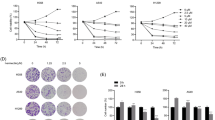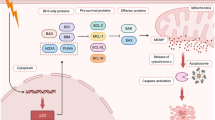Summary
The anti-cancer effects of betulinic acid (BA) on Jurkat cells and its in vitro mechanism were examined by using MTT assay. Apoptosis was detected by using Hoechst33258 staining and annexin-V/PI double-labeled cytometry. The effects of betulinic acid on the cell cycle of Jurkat cells were studied by propidium iodide method. RT-PCR and Western blotting were used to analyze the changes of cyclin D3, bcl-xl mRNA and protein levels in Jurkat cells after treatment with betulinic acid. Our results showed the proliferation of Jurkat cells was decreased in betulinic acid-treated group with a 24-h IC50 value being 70.00 μmol/L. Betulinic acid induced apoptosis of Jurkat cells in a time- and dose-dependent manner. The number of Jurkat cells treated with betulinic acid showed an increase in G0/G1 phase and decrease in S phase. After treatment with 0, 20, 60, 100 μmol/L betulinic acid for 24 h, the number of Jurkat cells was increased from (31.00±1.25)% to (58.84±0.32)% in G0/G1 phase, whereas it was decreased from (61.45±1.04)% to (35.82±1.95)% in S phase. PBMCs were less sensitive to the cytotoxicity of betulinic acid than Jurkat cells. The expressions of cyclin D3, bcl-xl mRNA and protein were decreased sharply in Jurkat cells treated with betulinic acid. It is concluded that betulinic acid is able to inhibit the proliferation of Jurkat cells by regulating the cell cycle, arrest cells at G0/G1 phase and induce the cell apoptosis. The anti-tumor effects of betulinic acid are related to the down-regulated expression of cyclin D3 and bcl-xl.
Similar content being viewed by others
References
Mukherjee R, Kumar V, Srivastava S K et al. Betulinic acid derivatives as anticancer agents: structure activity relationship. Anticancer Agents Med Chem, 2006,6(3): 271–279
Yu D, Morris-Natschke S L, Lee K H et al. New developments in natural products-based anti-AIDS research. Med Res Rev, 2007,27(1):108–132
Ziegler H L, Franzyk H, Sairafianpour M. Erythrocyte membrane modifying agents and the inhibition of Plasmodium falciparum growth: structure-activity relationships for betulinic acid analogues. Bioorg Med Chem, 2004,12(1):119–127
Hata K, Hori K, Ogasawara H et al. Antileukemia activities of Lup-28al-20(29)-en-3-one, a lupane triterpene. Toxocol Lett, 2003,143(1):1–7
Fernandes J, Castilho R O, Rangel M et al. Pentacyclic triterpenes from Chryssobalanaceae species: cytotoxicity to multidrug ressistant and sensitive leukemia cell lines. Cancer Lett, 2003,190(2):165–169
Lai W, Huang L, Ho P et al. Betulinic acid derivatives that target gp120 and inhibit multiple genetic subtypes of human immunodeficiency virus type 1. Antimicrob Agents Chemother, 2008,52(1):128–136
Rajendran P, Jaggi M, Singh M K et al. Pharmacological evaluation of C-3 modified betulinic acid derivatives with potent anticancer activity. Invest New Drugs, 2008,26(1): 25–34
Chintharlapalli S, Papineni S, Ramaiah S K et al. Betulinic acid inhibits prostate cancer growth through inhibition of specificity protein transcription factors. Cancer Res, 2007,67(6):2816–2823
Zuco V, Supino R, Righetti S C et al. Selective cytotoxicity of betulinic acid on tumor cell lines, but not on normal cells. Cancer Lett, 2002,175(1):17–25
Liu W K, Ho J, Cheung F W K et al. Apoptotic activity of betulinic acid derivatives on murine melanoma B16 cell line. Eur J Pharmacol, 2004,498(1–3):71–78
Galgon T, Wohlrab W, Drager B et al. Betulinic acid induces apoptosis in skin cancer cells and differentiation in normal human keratinocytes. Exp Dermatol, 2005,14(10): 736–743
Seto M. Genetic and epigenetic factors involved in B-cell lymphomagenesis. Cancer Sci, 2004,95(9):704–710
Motti M L, Boccia A, Belletti B et al. Critical role of cyclin D3 in TSH-dependent growth of thyrocytes and in hyperproliferative diseases of the thyroid gland. Oncogene, 2003,22(48):75–76
Florenes V A, Faye R S, Maelandsmo G M et al. Levels of cyclinD1 and D3 in malignant melanoma: deregulated cyclin D3 expression is associated with poor clinical outcome in superficial melanoma. Clin Cancer Res, 2000,6(9):3614–3620
Filipits M, Jaeger U, Pohl G et al. Cyclin D3 is a predictive and prognostic factor in diffuse large B-cell lymphoma. Clin Cancer Res, 2002,8(3):729–733
Decker T, Hipp S, Ringshausen I et al. Rapamycin-induced G1 arrest in cycling B-CLL cells is associated with reduced expression of cyclin D3, cyclin E, cyclin A, and survivn. Blood, 2003,101(1):278–285
Decker T, Schneller F, Hipp S et al. Cell cycle progression of chronic lymphocytic leukemia cells is controlled by cyclin D2, cyclin D3, cyclin-dependent kinase (cdk) 4 and the cdk inhibitor p27. Leukemia, 2002,16(3):327–334
Yang C C, Lin H P, Chen C S et al. Bcl-xL mediates a survival mechanism independent of the phosphoinositide 3-kinase/Akt pathway in prostate cancer cells. J Biol Chem, 2003,278(28):25872–25878
Ehrhardt S, Fulda S, Führer M et al. Betulinic acid-induced apoptosis in leukemia cells. Leukemia, 2004,18(8):1406–1412
Author information
Authors and Affiliations
Corresponding author
Additional information
Zi CHEN, Female, born in 1980, Resident
This project was supported by a grant from the National Natural Sciences Foundation of China (No. 30500686).
Rights and permissions
About this article
Cite this article
Chen, Z., Wu, Q., Chen, Y. et al. Effects of betulinic acid on proliferation and apoptosis in Jurkat cells and its in vitro mechanism. J. Huazhong Univ. Sci. Technol. [Med. Sci.] 28, 634–638 (2008). https://doi.org/10.1007/s11596-008-0604-9
Received:
Published:
Issue Date:
DOI: https://doi.org/10.1007/s11596-008-0604-9




